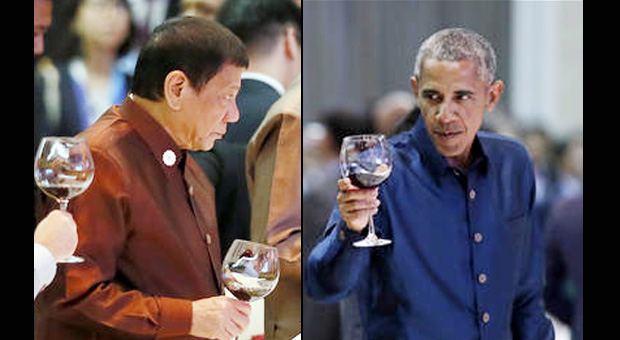Duterte’s drug war puts strain on US-Philippine ties

Philippine President Rodrigo Duterte and US President Barack Obama, right, during the gala dinner of ASEAN leaders and its Dialogue Partners in the ongoing 28th and 29th ASEAN Summits and other related summits at the National Convention Center Wednesday, Sept. 7, 2016 in Vientiane, Laos. AP
WASHINGTON, United States — When Rodrigo Duterte became Philippine president many predicted his desire to mend relations with China could alienate the United States. Instead, his deadly war on drugs and refusal to brook criticism on human rights have quickly strained relations with the Obama administration.
Duterte’s “son of a bitch” slur against President Barack Obama scuppered a formal meeting between the two leaders this week, presaging rocky times ahead in one of Washington’s most valued alliances in Asia.
Duerte’s tough talk and action has struck a chord with Filipinos, but it is rubbing the U.S. the wrong way, although it is ultimately the Philippines which has the most to lose from a fracturing of relations. The U.S. is an important source of assistance for its meager military and is treaty-bound to come to the Philippines’ defense if it comes under attack.
On Wednesday, the Philippine government released what it says are surveillance pictures of Chinese coast guard ships and barges at a disputed Scarborough Shoal in the South China Sea — heightening concern that China may expand its massive campaign of land construction that has alarmed neighbors and rival claimants. That is a scenario which could put to the test what the Obama administration often says is an “ironclad” commitment to its Philippine ally.
Historically tempestuous ties between the Philippines and the U.S., its former colonial power, blossomed under Duterte’s predecessor, Benigno Aquino III, who riled Beijing by challenging its territorial claims at an international tribunal. Shortly before he left office, Aquino agreed to allow U.S. forces access to five Philippine military bases — opening the way to what would be the most significant American military deployment in the Southeast Asian nation since the U.S. was forced to close its own military bases there a quarter-century ago.
Amy Searight, a former senior U.S. defense official who led the final negotiations, said the alliance remains strong and U.S. officials are not too concerned about the pending implementation of the new defense cooperation pact — a key part of the Obama administration’s strategic push into Asia.
“Duterte has not given any signals that he sees abandoning or substantially weakening the alliance with the United States as a way to reach a better deal with China, nor should he. You don’t approach a country like China from a position of weakness, you approach them from a position of strength,” said Searight, now director of the Southeast Asia program at the Center for Strategic and International Studies think tank.
She said more worrisome in Duterte’s outburst was that he was tapping into anti-colonial sentiments against America that lingers in some quarters in the Philippines. She also said that the war on drugs his government is prosecuting would be a significant problem and source of friction in the relationship.
Since he took office as president on June 30, more than 2,000 people have been gunned down in a crackdown on drug dealers and users that has prompted expressions of concern from the U.S. over extra-judicial killings. The crackdown has evoked comparisons with so-called “death squads” that operated in southern Davao city while Duterte was the longtime, crime-fighting mayor.
Duterte, a brash figure whose trash-talking has become his trademark, took Obama to task on the eve of their first planned meeting at a regional summit in Laos. He warned the world’s most powerful man not to question him about the rising body count in his crackdown or “son of a bitch I will swear at you.”
The State Department on Tuesday objected to the “tone” of the rhetoric, saying it had raising questions about whether a productive conversation with the Philippine government on such issues. Spokesman Mark Toner said the U.S. would continue to call for due process.
“There must be ways to fight against drugs that are consistent with international standards and norms. And that’s going to consistently be our message going forward,” Toner told reporters in Washington. He added the U.S. would “keep an eye” on whether the Philippines was living up to that obligation.
Duterte has expressed regret for his outburst against Obama, and Philippine officials said he met briefly and informally with the U.S. president Wednesday before a banquet at the summit. But continued U.S. scrutiny of his policies could feed into his long-standing antipathy toward what he views as U.S. interference in domestic issues.
That sentiment appears to date back to 2002, when a U.S. citizen was severely wounded in a deadly blast apparently caused by explosives he had stored in his hotel room in Davao. Local authorities contended that the man, believed to be a treasure hunter, was evacuated to the U.S. without their consent. The incident played out during an upsurge in Muslim militant violence in the region.
In subsequent years, Duterte accused Washington of hypocrisy for criticizing other countries on human rights in light of the invasion of Iraq and its aftermath.
“The U.S. is the No. 1 human rights violator. They torture prisoners and you call them clean?” he told local television in 2007. He even threatened to give a senior State Department official “a beating” if he came to the city.
Since becoming president, he has unloaded on the U.S. ambassador to Manila, calling him gay in derogatory terms and accusing him of meddling in the elections that Duterte won handily.
RELATED VIDEOS














